AI-powered customer service insights shared by over 1000 AI leaders globally.
Artificial intelligence is no longer a distant dream for customer service. It’s rapidly reshaping how companies communicate, resolve queries, and build loyalty, much like the impact the internet had on business in the early 2000s. With the rise of large language models (LLMs) and Agentic AI, enterprises have entered a new era, one where support is not just automated but proactively tailored to each customer’s needs.
But as adoption accelerates, new questions arise:
Which use cases are prioritized for AI? How is AI helping or influencing every step of the user journey? And what obstacles must organizations overcome to make AI-driven customer service scalable, secure, and genuinely helpful? Drawing insights from leading research and real-world deployments, the Kore.ai report, AI Use Cases: Insights from AI Decision Makers 2025, illuminates these questions for today’s business leaders. Based on feedback from 1000+ enterprise leaders, it reveals the real-world impact of AI on customer-facing functions, from hospitality and retail to telecom and beyond.
This blog delivers an insider’s look into what matters most for global CX leaders, the priorities, challenges, investments, and strategies shaping AI’s next chapter in customer service.
So let’s dive in.
Surveyed in March 2025 by Paradoxes and supported by Kore.ai, ‘AI Use Cases: Insights from AI Decision Makers – 2025’ reveals how enterprise leaders think about AI, primary use cases, challenges, success metrics, and planning for future AI.
The survey gathered insights from over 1000 senior business and technology leaders across 12 countries, including the U.S., UK, Germany, UAE, India, Singapore, Philippines, Japan, Korea, Australia, and New Zealand.
Download the complete report.)
AI for customer service: transforming support
AI for customer service is no longer just about automating responses and reducing ticket queues; it's an intelligent partner, proactively enhancing customer experiences at every touchpoint. According to the Kore.ai survey, 24% of enterprises consider AI for customer service the most important use case, reflecting a rising prioritization across industries.
It is therefore no wonder that 85% of customer service leaders will explore customer-facing conversational GenAI in 2025, according to Gartner.
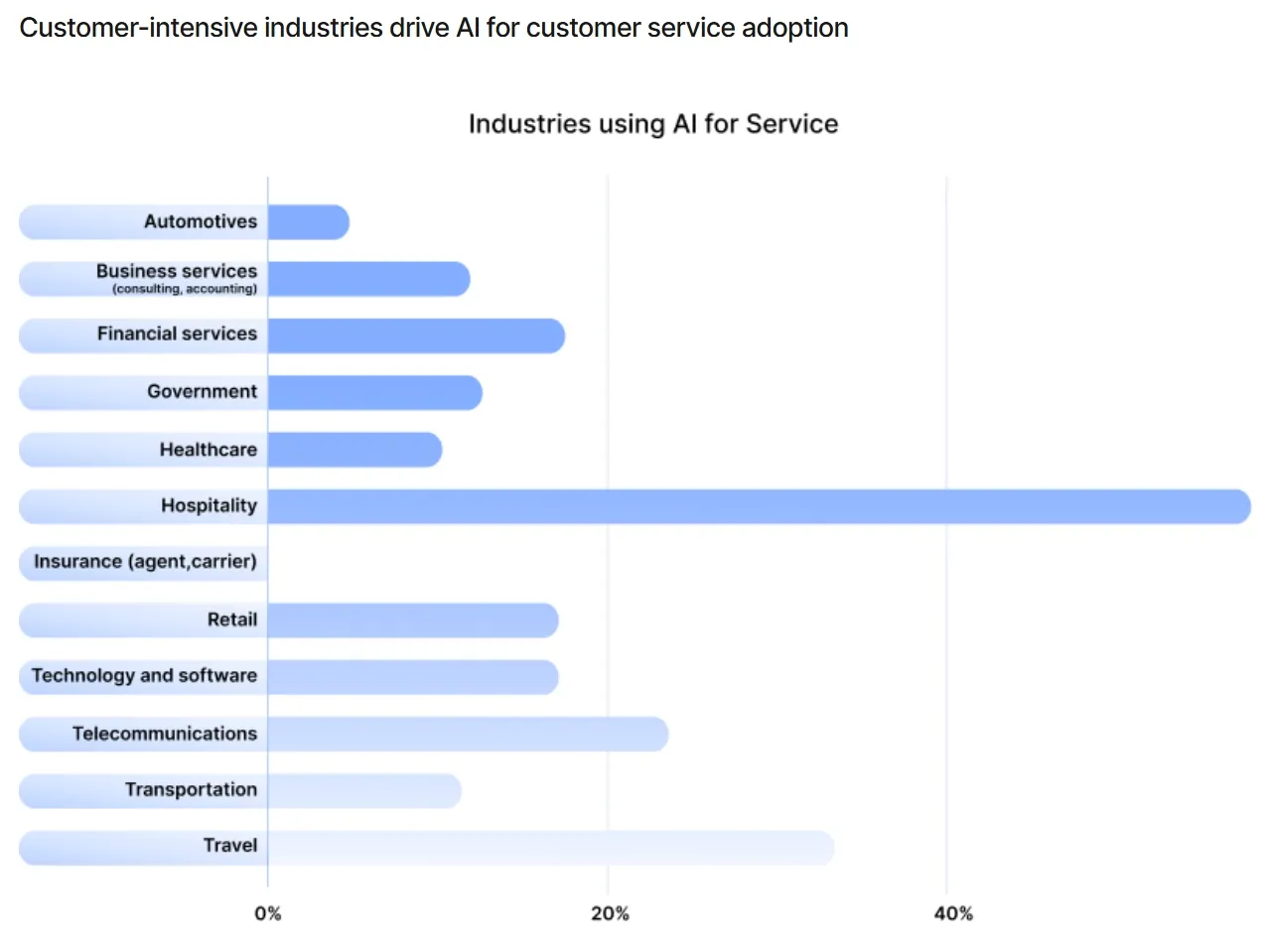
Industries such as hospitality and travel, which thrive on frequent customer interactions, are leading the AI for customer service adoption. They are leveraging AI to streamline queries, shorten wait times, and deliver consistent support even during surges. Telecom, finance, retail, and tech aren’t far behind; these sectors are doubling down on AI for faster answers and personalized service. Meanwhile, insurance and automotive, despite huge customer volumes, remain cautious, favoring gradual implementation and traditional approaches to direct AI-driven service.
The data further highlights a global dimension to AI adoption trends. New Zealand (37%), the UAE (27%), Japan (24%), and India (25%) are leaders in putting AI at the core of customer service, reaping the benefits of proactive, always-on experiences. Meanwhile, in the USA (14%), the UK (13%), Germany (13%), and Canada (18%), enterprises show a stronger preference for AI in business process automation rather than direct customer interactions.
AI for customer service use cases: where is it driving real value?
As AI moves beyond pilot projects into everyday operations, it’s becoming clear exactly where enterprises are leveraging AI to transform customer service.
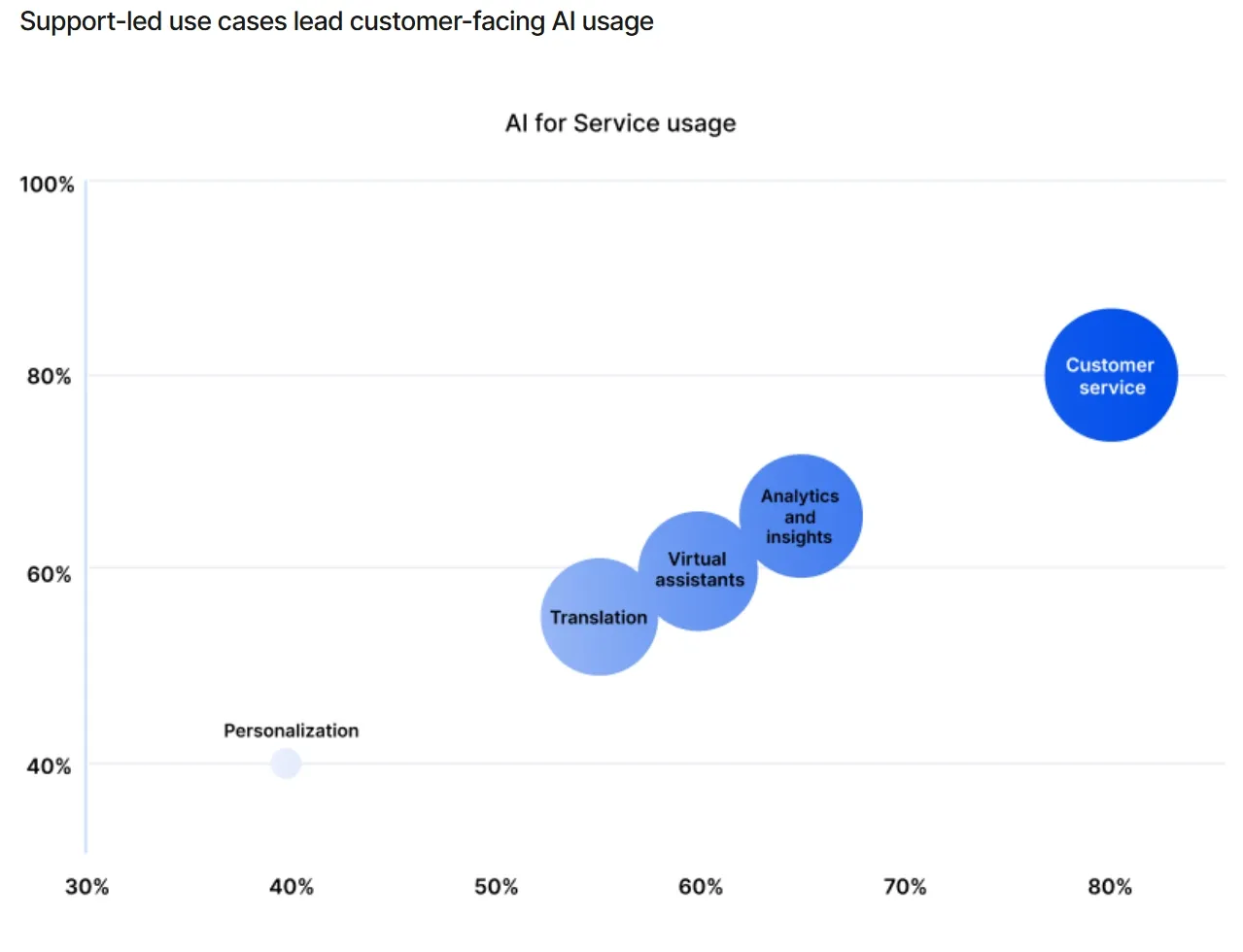
- Customer support & chatbots dominate adoption, with nearly 80% of enterprises using them to provide instant answers and streamline ticket resolution, freeing agents for more complex cases and slashing wait times.
- AI-powered analytics & insights follow closely at 65% adoption, helping businesses spot trends, monitor issues, and deliver proactive service. More and more customer service managers rely on generative AI for analyzing sentiment and customer feedback.
- Virtual assistants, such as AI Copilots are now in use by about 60% of organizations, guiding users through tasks and providing 24/7 support, especially valuable for high-demand sectors like finance and travel.
- Translation is also on the rise, with 55% adoption rates, enabling global support and making multilingual help seamless.
- Personalization, although at 40% adoption, is poised for fast growth as brands aim to offer tailored help rather than generic solutions.
AI for customer service challenges: what’s holding enterprises back?
While AI promises to revolutionize customer service, many enterprises face real hurdles slowing down adoption and impact.
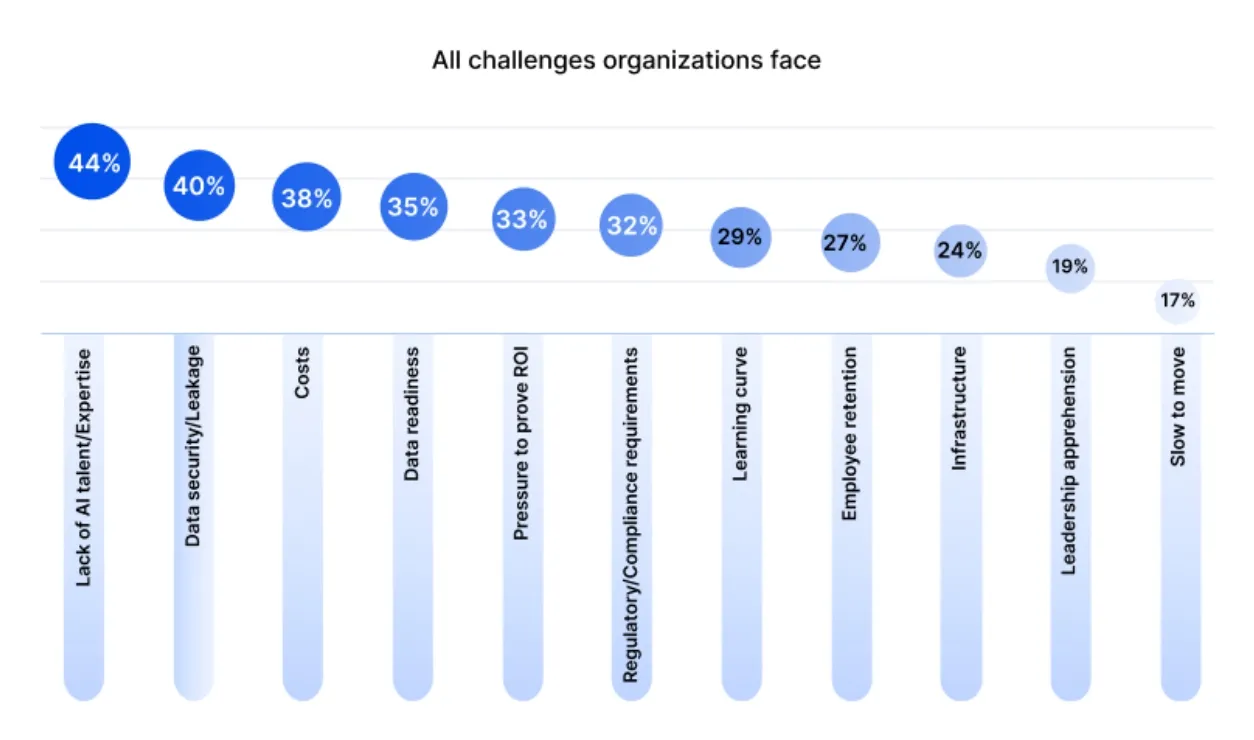
Data security and leakage
Data security & leakage risks top the list, cited by 44% of organizations. As customers engage with chatbots and self-service tools, protecting sensitive information is critical to maintain trust and comply with regulations. This aligns with Microsoft's report that says, data security is a top challenge and leaders are hesitant to fully embrace AI until they adopt a stronger data security posture and data governance structure.
Talent gaps
Talent gaps remain a major obstacle, with 40% of enterprises reporting a lack of sufficient AI-literate professionals to deploy, manage, and scale AI solutions effectively. This skills shortage mirrors trends seen across the broader AI landscape.
This aligns with findings from McKinsey, which highlights that 46% of enterprise leaders cite skill gaps as a major barrier to AI adoption and they need to reskill their workforce within the next three years to keep pace with AI adoption.
Cost of LLMs
Cost concerns weigh heavily as well, with 38% of organizations citing the expense of AI technology, including infrastructure and ongoing licensing fees, as a barrier to wider deployment.
Return on investment
Pressure to demonstrate ROI affects 33% of companies, reflecting challenges in measuring the true business impact of AI investments in high-volume customer service environments. The report also reveals that despite the above challenges, issues like infrastructure limitations, leadership hesitation, and internal resistance remain relatively low, indicating a strong organizational commitment to harnessing AI’s potential for customer experience.
How are enterprises measuring AI for customer service success?
Enterprises are laser-focused on measuring AI success by what really matters most, the customer experience.
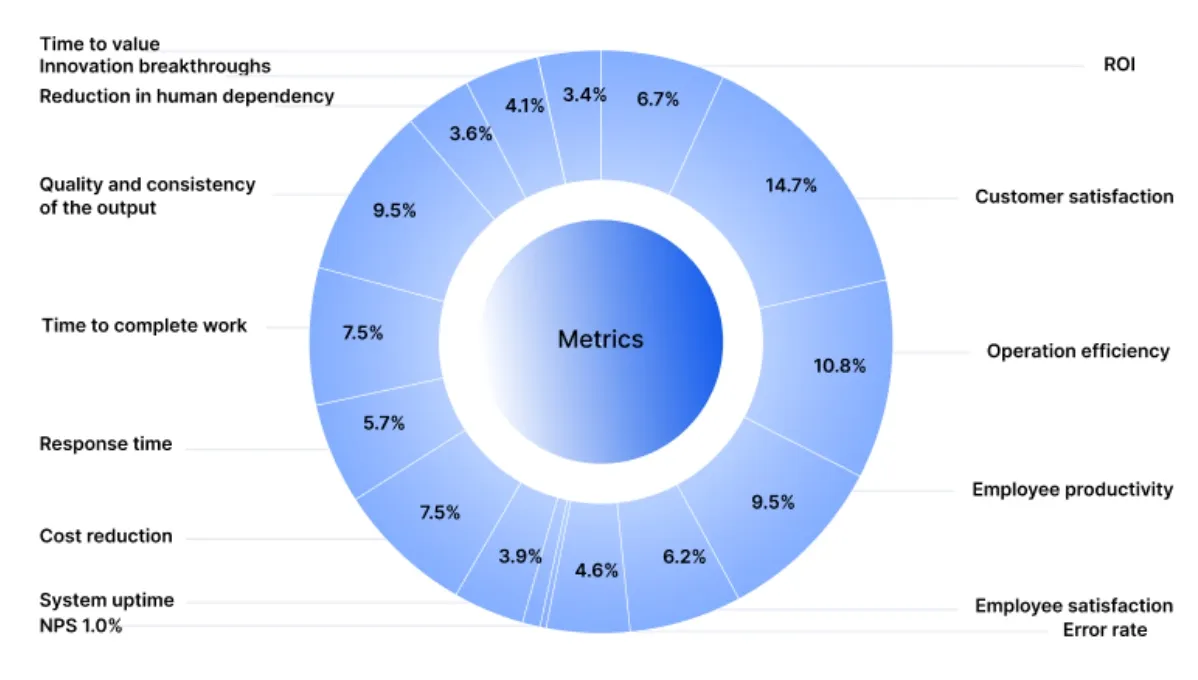
The top metric leading the way is customer satisfaction (14.7%), reflecting a priority to delight users and foster loyalty. Close behind is operational efficiency (10.8%), signaling a dual focus on keeping service fast, scalable, and cost-effective. This shift toward customer-centric KPIs marks a move beyond experimental hype to grounded, outcome-driven AI deployments. Organizations want to know: Are customers happier? Are service processes smoother and more reliable? These findings align with broader AI research, including McKinsey’s report, highlighting that measurable gains in speed, quality, and human output are now the true yardsticks of AI success, not just technology adoption alone.
Lessons learned: what early AI for service projects reveal
Early AI deployments in customer service have taught enterprises invaluable lessons that are shaping how they scale future initiatives.
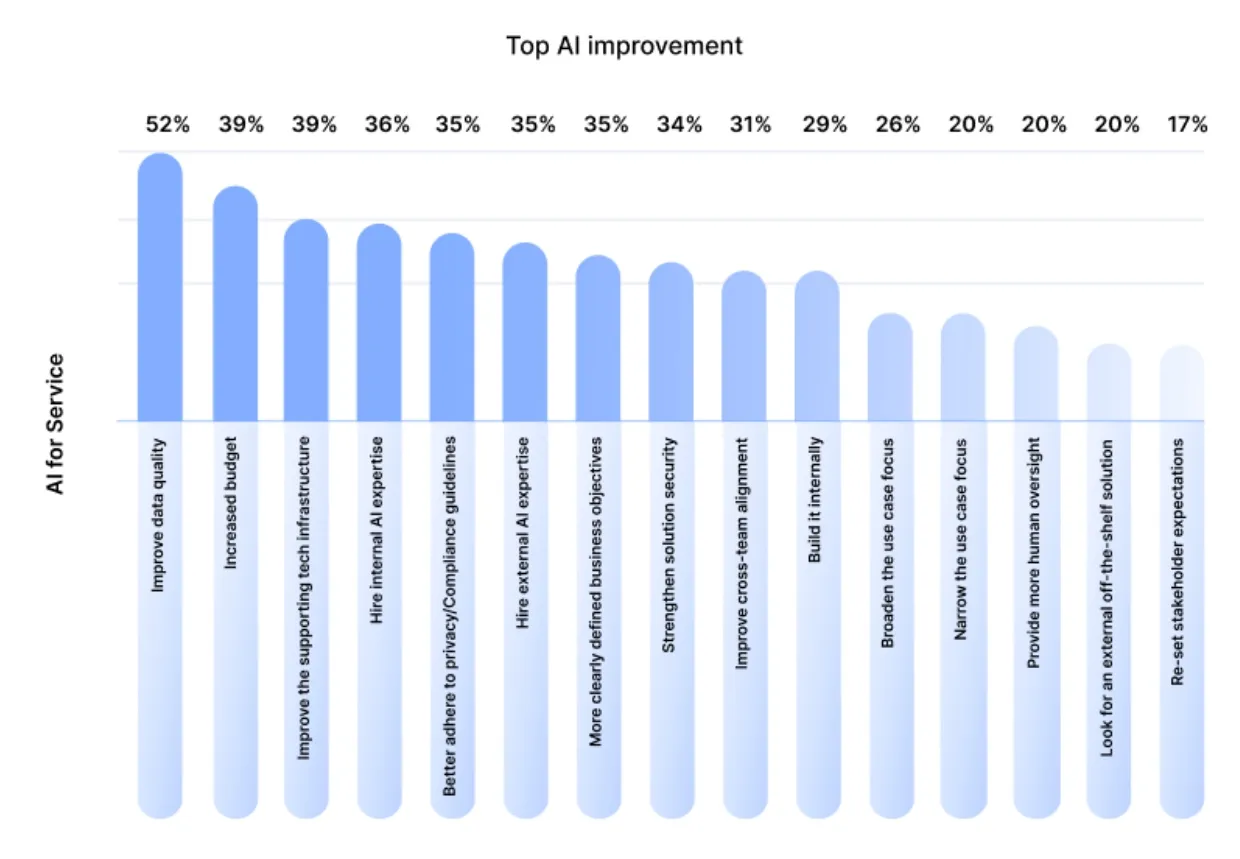
Two-thirds of organizations now say they will strengthen AI expertise, either by upskilling current employees (36%) or hiring new talent with specialized skills (35%). Beyond talent, 52% of respondents plan to improve data quality, recognizing it as critical for effective AI performance. Securing an adequate budget remains a priority for 39%, ensuring resources for technology, training, and ongoing optimization. These lessons show a shift from experimentation to building scalable, sustainable AI initiatives that truly enhance customer experience.
Investment outlook: AI for customer service is gaining ground
Despite early adoption hurdles and a steep learning curve, enterprise conviction around AI for workplace use cases remains robust. According to the survey, 92% of organizations plan to increase investment in AI for customer service use cases over the coming months, while 8% expect spending to remain steady.

This upward trajectory is supported by a McKinsey study showing that, over the next three years, 92 percent of companies plan to increase their AI investments – a dramatic rise that signals growing trust in AI’s business impact.
Final thoughts
The message from today’s research is clear: AI is rapidly becoming a core pillar of customer service strategies. From expanding budgets to broad, scaled deployments, leaders are betting on AI’s power to drive faster, more personalized, and proactive support at scale. But with opportunity comes responsibility. As organizations deepen investments in AI talent and infrastructure, expectations around security, transparency, and measurable ROI are higher than ever. The true game-changer won’t just be adopting AI systems, but embedding Agentic AI into everyday customer interactions, such as empowering agents, anticipating needs, and creating seamless, personalized journeys. This blog has highlighted key trends and insights, but the full Kore.ai AI Use Case Report offers a deeper dive into how top-performing enterprises are turning AI potential into real-world customer success.
FAQs
Q1. What is AI for customer service?
AI for customer service refers to the use of artificial intelligence technologies, like chatbots, virtual assistants, copilots, AI agents, and predictive analysis to automate, personalize, and enhance customer interactions. It helps businesses operate more efficiently and deliver consistent support across channels, improving both customer satisfaction and agent productivity.
Q2. What are some examples of AI for customer service?
Common examples include:
- Chatbots and virtual assistants that answer FAQs and handle routine queries.
- AI-powered analytics that monitor customer sentiment and predict issues.
- Voice assistants that enable hands-free interactions.
- Translation tools that support multilingual customers.
- Personalization engines that tailor recommendations and responses to individual users.
These applications help businesses deliver faster, smarter, and more human-like support experiences.
Q3. How is Agentic AI transforming customer service?
Agentic AI goes beyond traditional automation. It allows AI systems to act proactively and autonomously, analyzing context, anticipating customer needs, and taking action without direct instruction.
For example, an AI agent might detect a delivery delay, notify the customer, and offer a compensation credit automatically. This evolution turns AI into an intelligent partner that drives loyalty through foresight and personalization.
Q4. What are the benefits of using AI in customer service?
AI helps businesses improve both efficiency and experience. It reduces response times, operates 24/7, and ensures consistent service quality. At the same time, it empowers human agents with real-time insights and context, helping them resolve complex issues faster. The result is higher customer satisfaction, lower operational costs, and greater brand loyalty.

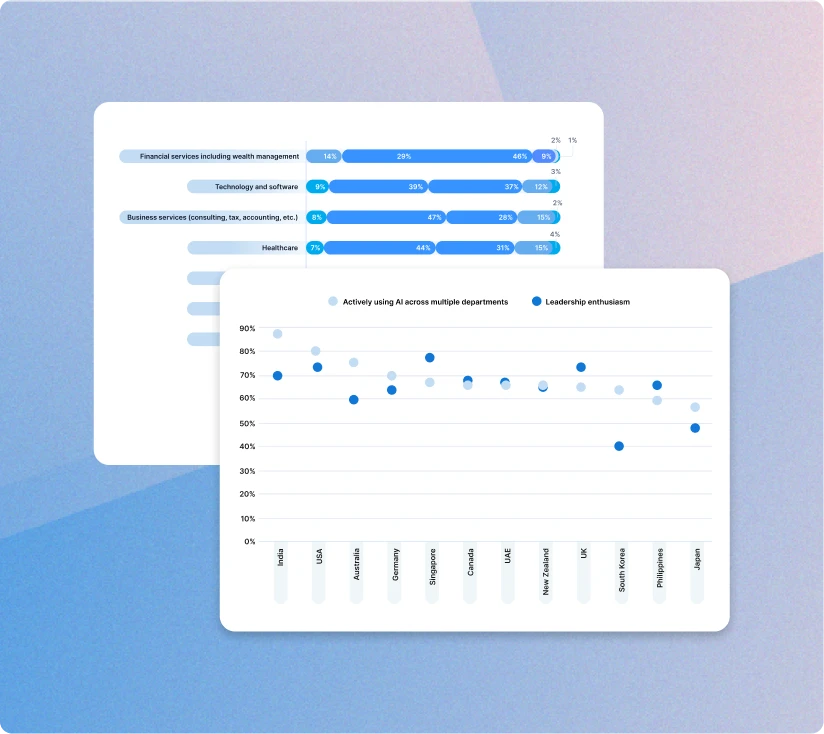


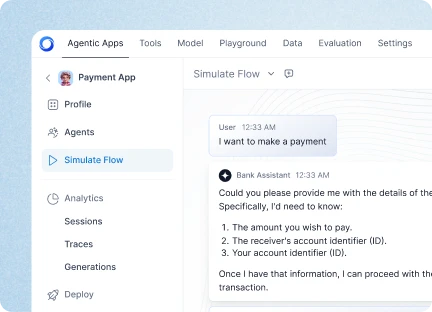


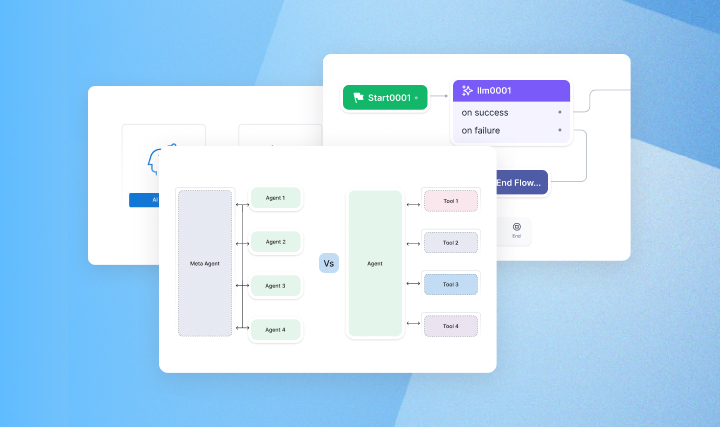

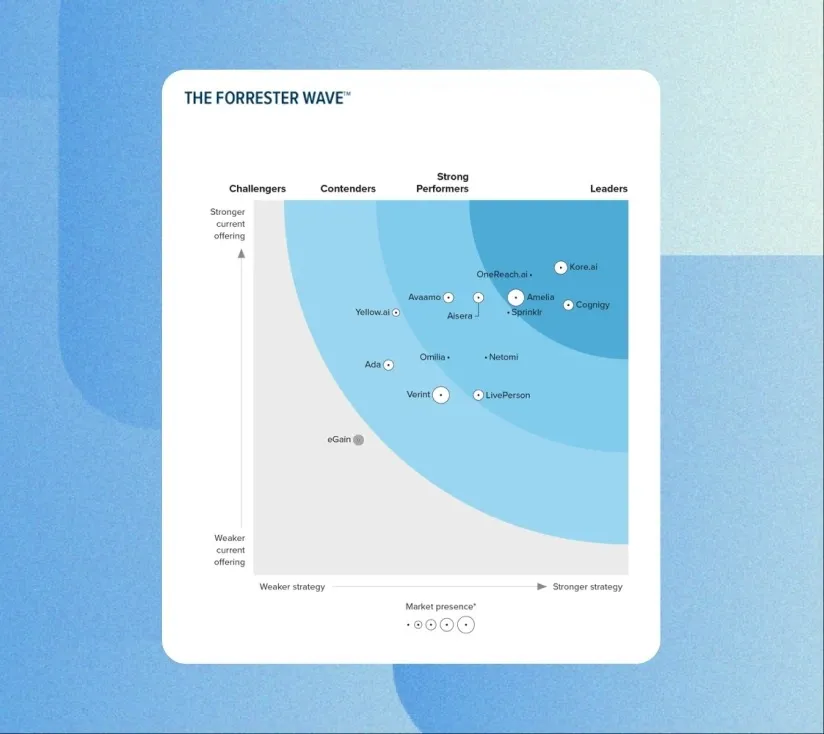


.webp)






